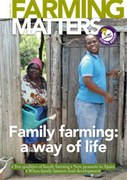
Scientists and governments have a key role to play in addressing the challenges that face sustainable family farming. In order to do this, they have to create partnerships, increase multi-way communication, and improve their collaborations with others. Bridging gaps between various actors can help a joint dialogue and find common ground. Ultimately change will only occur when the government, farmers, scientists and civil society, including youth, are willing to turn things around.
We are working to develop a regional think tank to boost learning and sharing on family farming in Africa. Called “Africa Family Farming Workshops” (AFFW), this think tank has three main objectives: to encourage innovative scientific approaches and best practices of family farming, to promote interdisciplinary collaboration, and to involve young agricultural professionals. It is not a new idea to gather academic researchers in periodic meetings focused on agriculture. But the AFFW innovates on three fronts. In the first place, the meetings are designed to support small scale family farming in Africa. Secondly, academics will come from different disciplines. Finally, the workshops will also include practitioners from administrations, international organisations, civil society, farmer organisations, business and trade unions.
Through such interdisciplinary collaboration, we believe that we will be able to make family farming truly “a country’s backbone of both rural development and national economic growth”, to quote Eve Crowley from the FAO.
Originally from Benin, Ariel Djomakon is the Head of the Sustainable Agriculture Division at YPAD (Youth Partnership and Agricultural Development). Moubarakatou Tassou is the Head of the Women’s Empowerment & Youth Division at YPAD. Lucile Gentil is a French student. All the authors are associated with AFFW (Africa Family Farming Workshops). E-mail: ar.djomakon@ypadong.org


